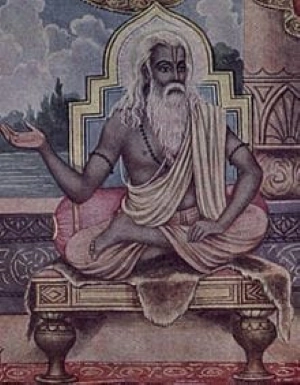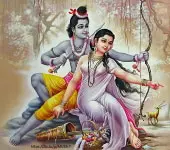Shiva burned Kamadeva at Chhapra, Bihar
Comments
Why is water significant in Hindu culture, and how does Varuna relate to it?
Water holds great significance in Hindu culture as it is believed to purify and cleanse both the body and the soul. Water is also seen as a symbol of life, fertility, and prosperity. Varuna is the god of water in Hinduism and is believed to have the power to control the oceans, rivers, and all forms of water.
Where can you find the stories of leelas of Sri Krishna?
Two main sources of Sri Krishna stories are 1. Tenth skandha of Srimad Bhagavatam 2. Garga Samhita.
Quiz
King Nahusha had become Indra for some time. Who cursed him to become a python ?Transcript
(Click here to read more)
Here's the corrected version: The River Sarayu meets the Ganga near Chhapra in Bihar. After leaving the palace in Ayodhya, Sri Ram Ji, Lakshmana, and Sage Viswamitra spent their first night on the banks of the Sarayu. The next place mentioned in the Valmiki Ramayana is the meeting point of the Sarayu and Ganga, located near Chhapra in present-day Bihar. The distance from Ayodhya is approximately 400 km. This aligns well with geographical information, supporting the assertion that Ramayana and Mahabharata are part of our real history. They discovered a serene ashra....
Transcript
(Click here)
Here's the corrected version:
The River Sarayu meets the Ganga near Chhapra in Bihar. After leaving the palace in Ayodhya, Sri Ram Ji, Lakshmana, and Sage Viswamitra spent their first night on the banks of the Sarayu. The next place mentioned in the Valmiki Ramayana is the meeting point of the Sarayu and Ganga, located near Chhapra in present-day Bihar. The distance from Ayodhya is approximately 400 km. This aligns well with geographical information, supporting the assertion that Ramayana and Mahabharata are part of our real history.
They discovered a serene ashrama there, and Sri Ram Ji inquired about the sage to whom the ashrama belonged. Viswamitra explained the history of the ashrama, situated in the ancient Anga Rajya or Anga Desha. The name "Anga" originates from the word for organs or body, as this is where Lord Shiva burned the body of Kamadeva to ashes while performing tapas. Kamadeva's attempt to arouse Bhagavan during his journey back to the ashrama with Parvathy Devi angered Lord Shiva, who turned him into ashes. This is the place where Kamadeva left his body, or Anga, becoming Ananga, bodiless.
In the ashrama, they encountered numerous brilliant tapaswis who had been observing tapas for thousands of Rishis. The Rishis had a premonition about their visit and were prepared to welcome them. The visit and stay at the ashrama served a purpose known to the Rishis, who took excellent care of the three guests, ensuring they spent the night comfortably.
Recommended for you
When to do ghata sthapana for Navaratri
 Click here to know more..
Click here to know more..
The real reason behind observing brahmacharya.
 Click here to know more..
Click here to know more..
Manisha Panchakam

pratyagvastuni nistarangasahajaa- nandaavabodhaambudhau vipro'yam shvapacho'yamityapi mahaanko'yam vibhedabhramah'. kim gangaambuni bimbite'mbaramana....
Click here to know more..
English Topics
Ramayana
Click on any topic to open
- 51 Tataka Test - Sriram Ji's Moral Dilemma
- 50 Janaka's Spiritual Evolution - From Jnana to Bhakti
- 49 Dasharatha's Grief Decoded
- 48 Shiva burned Kamadeva at Chhapra, Bihar
- 47 Motherhood brilliance - Kausalya Supraja Rama
- 46 Bala and Atibala Mantras - Sriram Ji will unfold their superpower
- 45 Dasharatha Pleads With Vishwamtra Not To Take Away Young Sriram Ji
- 44 Abandoning Of Sita Devi - Is It Justifiable?
- 43 Vishwamitra Wants To Take Young Sriram Ji With Him
- 42 Position Of Sages In Ancient Bharata
Please wait while the audio list loads..
30
Ganapathy
Shiva
Hanuman
Devi
Vishnu Sahasranama
Mahabharatam
Practical Wisdom
Yoga Vasishta
Vedas
Rituals
Rare Topics
Devi Mahatmyam
Glory of Venkatesha
Shani Mahatmya
Story of Sri Yantra
Rudram Explained
Atharva Sheersha
Sri Suktam
Kathopanishad
Ramayana
Mystique
Mantra Shastra
Bharat Matha
Bhagavatam
Astrology
Temples
Spiritual books
Purana Stories
Festivals
Sages and Saints
